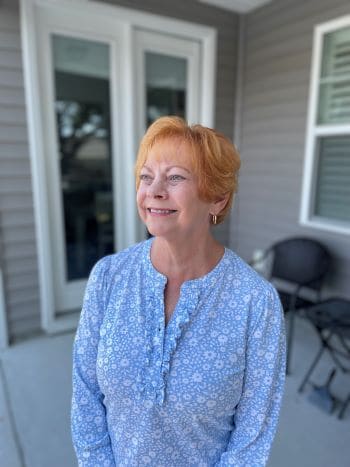Breast cancer survivor ‘indebted’ to family medicine physician who insisted she get a mammogram
An annual mammogram was the last thing on Sally Humphrey’s mind.
In 2021, she and her husband were moving from West Virginia to South Carolina, and all her focus was on packing, unpacking, finding furniture, getting into a temporary apartment and then finally a permanent home. She was about three months late on her annual breast cancer screening when she  went to see Tidelands Health family medicine physician Dr. Sean Nguyen, who offers care at Tidelands Health Family Medicine at The Market Common in Myrtle Beach.
went to see Tidelands Health family medicine physician Dr. Sean Nguyen, who offers care at Tidelands Health Family Medicine at The Market Common in Myrtle Beach.
Even though she didn’t have any symptoms, he recommended — or rather, insisted — that she go for her regular screening. So she did. And the screening showed an abnormality later determined to be cancer.
“I’m indebted to Dr. Nguyen for asking that simple question — ‘When was your last mammogram?’ — because it could have slipped right through the cracks,” says Humphrey, 74.
Women in their 70s are among the most likely to be diagnosed with breast cancer, according to data from the Centers for Disease Control and Prevention — even after a history of previous negative screenings or without the presence of a detectable lump. That’s the point of the screenings, explains Dr. Nguyen, medical director of primary care at Tidelands Health.
At Tidelands Health, it’s easy to schedule your screening mammogram – no provider order required. Find instructions to schedule online here, or call 1-866-TIDELANDS to schedule by phone.
“Many cases of breast cancer that we find are in women who don’t expect anything,” he says. “You can have a patient that’s had all normal mammograms to the age of 73, and you think, ‘Well, she’s made it this far…’ Then at 74, you find something.”
It applies to more than mammograms, he says. Any type of routine screening such as colonoscopy or blood work should be treated as a reset.
“It’s natural to get lulled into a false sense of safety by prior tests,” he says. “Every year you need to go in with a fresh set of eyes so you don’t miss things like this.”
For Humphrey, it was less a sense of security and more that she was so caught up with the stress of moving. She estimates that without talking to Dr. Nguyen, it could have taken another four to six months for her to get settled enough to think about scheduling a mammogram on her own.
“You just don’t think about those things because your mind is caught up with this or that,” she says. “The advice I would give to women is to get your mammogram every year, even if you’re busy with kids in school or work or both.”
For treatment, Humphrey chose Tidelands Health Cancer Care Network, the region’s most comprehensive provider of cancer care and the area’s only member of the MUSC Hollings Cancer Network, to help her beat the disease.
Dr. Sara Adams, medical director of oncology at Tidelands Health, says catching cancer early is crucial to combatting the disease.
“Very often there are no physical changes to the breast, which is why screening mammograms are so important,” Dr. Adams says. “The earlier we find the disease, the better the chance to beat it.”
After a mastectomy performed by Tidelands Health breast surgeon Dr. Angela Mislowsky, chemotherapy and a year of intravenous medicine, Humphrey is now cancer-free. She has arthritis in her side and some nerve damage, but she’s happy in her new Surfside Beach home.
“I’m dealing with that, and I’m tough,” she says. “I’m still living life.”